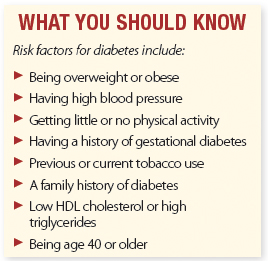Manage Diabetes To Prevent Severe Health Consequences
It’s not an exaggeration to say diabetes is rampant: About 37.3 million people living in the United States had diabetes in 2019, and another 96 million had prediabetes (a condition in which your blood glucose level is higher than normal but not high enough to qualify as diabetes), according to the 2022 National Diabetes Statistics report. Among adults ages 65 and older, 29 percent had diabetes, and nearly half had prediabetes.
Even though diabetes is so prevalent, nearly 20 percent of people who meet the criteria for diabetes don’t know they have it, largely because the disease produces no symptoms in the early stages. However, over the long term, diabetes can have debilitating effects, especially if it goes undetected and untreated.
Dangerous Complications
People who have diabetes are at a higher risk of cardiovascular disease. In fact, people with diabetes have nearly double the risk of dying from heart disease or stroke as people without diabetes.
“Diabetes is the ‘perfect storm’ for heart disease, since it causes or contributes to several risk factors, including elevated blood lipids, increased inflammation, and damage to small and large blood vessels,” explains Melissa Katz, MD, an assistant professor of clinical medicine at Weill Cornell Medicine.
Other possible complications from diabetes include diabetic retinopathy, which causes impaired vision or blindness, neuropathy (nerve damage, particularly in the feet and legs), and nephropathy (kidney damage). The risks of developing complications are higher if blood glucose levels are poorly managed.

Diagnosing Diabetes
A simple blood test can reveal whether or not you have diabetes or prediabetes.
“Testing is appropriate for people with obesity, coronary artery disease, hypertension (high blood pressure), hyperlipidemia (a high level of fat in the blood), and/or a family history of diabetes,” says Dr. Katz. A fasting plasma glucose test is often included with the bloodwork doctors order at annual exams. The hemoglobin A1C test, an indicator of the average blood glucose level over the previous three months, is another screening tool.
Many people with prediabetes go on to develop diabetes. Making dietary changes and engaging in regular exercise is recommended for anyone with prediabetes, and some are given medication.
Multiple Medication Options
Type 2 diabetes medications regulate the way the body metabolizes glucose (sugar). Insulin, which is produced by the pancreas, regulates the movement of glucose into cells. Blood glucose becomes elevated when your body resists the effects of insulin, does not produce enough of it, or both. There are several classes of diabetes medications, and many new medications have been developed in recent years.
Some of the newer medications are in a class of drugs called GLP-1 agonists, including semaglutide (Ozempic), dulaglutide (Trulicity), liraglutide (Victoza), and exenatide (Byetta).
“The GLP-1 agonists are excellent medications for patients with type 2 diabetes, especially those with obesity, since they also help with weight loss in many patients,” advises Dr. Katz. “Semaglutide and dulaglutide also have positive effects on cardiovascular health.”
“Medication selections should be individualized for each patient,” says Dr. Katz. “We consider factors including age, weight, medical history, kidney function, risks and possible side effects associated with each type of drug, and the mode of administration.”
Lifestyle Strategies
Diet and exercise are essential components of a diabetes treatment plan.
Your diet has a direct effect on how your body manages insulin. Foods that contain carbohydrates are broken down into glucose, so controlling the amount and type of carbs you eat is key.
“Apps that inform people of the carbohydrate content of foods are eye-opening for many patients,” advises Dr. Katz. She recommends an app called Glooko, which is available on the App Store or on Google Play.
Exercise improves how your body responds to insulin, which decreases your blood glucose level.
If you have diabetes, regardless of what tools and strategies you use, making your best efforts to control your blood glucose level will cut your risk of serious complications.
The post Manage Diabetes To Prevent Severe Health Consequences appeared first on University Health News.
Read Original Article: Manage Diabetes To Prevent Severe Health Consequences »

